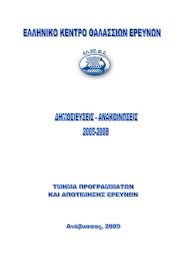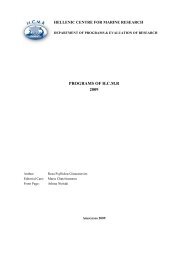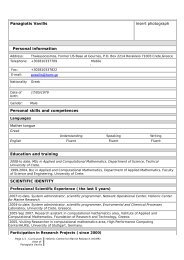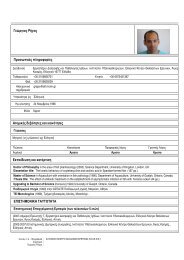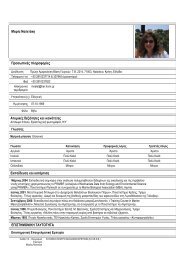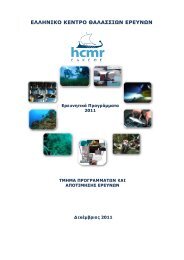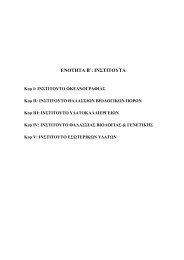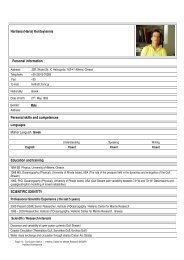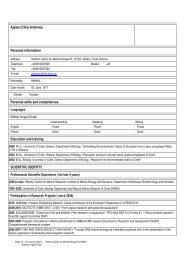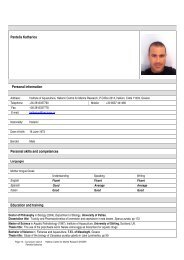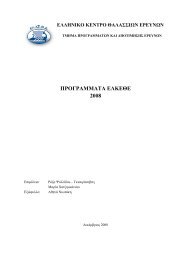2011 Research Programmes of the HCMR - Hellenic Centre for ...
2011 Research Programmes of the HCMR - Hellenic Centre for ...
2011 Research Programmes of the HCMR - Hellenic Centre for ...
Create successful ePaper yourself
Turn your PDF publications into a flip-book with our unique Google optimized e-Paper software.
A long-term strategy will be defined and sites will be chosen as an EMSO-PP deliverable<br />
(WP7);<br />
Engineering specifications will be established <strong>for</strong> each chosen site. These specifications will<br />
describe all engineering aspects required <strong>for</strong> consistent cost estimation and <strong>the</strong> launching <strong>of</strong> <strong>the</strong><br />
realisation phase. Specific technical bottlenecks that may jeopardise <strong>the</strong> long-term reliability <strong>of</strong><br />
<strong>the</strong> infrastructure sub-systems will be experimentally examined (WP8). Prototypes will be<br />
deployed and tested;<br />
A long-term commitment will be obtained from <strong>the</strong> involved funding agencies through <strong>the</strong><br />
activation <strong>of</strong> discussion tables where <strong>the</strong> largest possible political convergence will be reached<br />
and <strong>for</strong>malised in specific agreement protocols and MoUs.<br />
Marine Ecosystem Evolution in a Changing Environment (MEECE/ 756)<br />
Scientific Coordinator:<br />
Dr G. Triantafyllou<br />
Funding: EU (75%) & GSRT (25%)<br />
Starting Year: 2008<br />
Duration: 48 months (01/09/08-31/08/12)<br />
Total Budget: 183.854 €<br />
Study Area:<br />
Project: Europe wide sea areas plus Benguela system & <strong>HCMR</strong>:<br />
Aegean<br />
Scientific team (ΗCMR): IO: Dr G. Triantafyllou, Dr G. Petihakis IMBR: Dr C.J. Smith, K.<br />
Papadopoulou<br />
O<strong>the</strong>r Participants: (1) Plymouth Marine Laboratory (PML), UK, (Coordinator) (2) UNIFOB AS<br />
Norway (3) University Hamburg (UHH) Germany (4) Fundación AZTI - AZTI Fundazioa<br />
(Technalia AZTI), Spain (5) Università di Bologna (UNIBO), Italy (6) Wageningen IMARES<br />
B.V., Ne<strong>the</strong>rlands (7) <strong>Centre</strong> <strong>for</strong> Environment, Fisheries and Aquaculture Science (CEFAS), UK<br />
(8) Natural Environment <strong>Research</strong> Council (NERC), UK (9) Institut de Recherche pour le<br />
Développement (IRD), France (10) Technical University <strong>of</strong> Denmark, Danish Institute <strong>for</strong><br />
Fisheries <strong>Research</strong> (DIFRES), Denmark (11) Institute <strong>of</strong> Marine <strong>Research</strong> (IMR), Norway (12)<br />
Institute <strong>of</strong> Marine Sciences, Middle East Technical University (IMS-MET), Turkey (13) <strong>Centre</strong><br />
National de la Recherche Scientifique (CNRS), France (14) Sir Alister Hardy Foundation <strong>for</strong><br />
Ocean Science (SAHFOS), UK (15) Università del Piemonte Orientale (UPd), Italy (16) Klaipeda<br />
University Corpi (KU Corpi), Lithuania (17) Bolding & Burchard Hydrodynamics (BBH),<br />
Germany (18) Instituto Español de Oceanografía (IEO), Spain (19) Commissariat à l'énergie<br />
atomique (CEA), France<br />
Brief Description <strong>of</strong> <strong>the</strong> Program: The project aims to develop predictive management tools and<br />
strategies to resolve dynamic ecosystem interactions. The overall concept addresses global change,<br />
<strong>the</strong> result <strong>of</strong> natural and anthropogenically induced climate change impacts upon <strong>the</strong> structure and<br />
function <strong>of</strong> marine ecosystems via a number <strong>of</strong> abiotic and biotic drivers. In particular, global<br />
change will lead to large scale changes in climate patterns, ocean circulation and climate (i.e.<br />
structure, temperature and light) while enhanced atmospheric CO2 levels will lead to acidification<br />
<strong>of</strong> <strong>the</strong> oceans. These changes, will all impact on <strong>the</strong> overall trophodynamic structure and<br />
functioning <strong>of</strong> marine ecosystems. Simultaneously, combinations <strong>of</strong> direct anthropogenic drivers<br />
such as fishing, eutrophication and pollution influences <strong>the</strong> competitive ability and dominance <strong>of</strong><br />
key species and thus <strong>the</strong> structure <strong>of</strong> marine ecosystems. Finally <strong>the</strong> introduction <strong>of</strong> alien invasive<br />
species has <strong>the</strong> potential to restructure marine ecosystems, a mechanism <strong>of</strong> change, which has <strong>the</strong><br />
potential to be intensified when key species are under stress due to <strong>the</strong> combined effects <strong>of</strong> abiotic<br />
and biotic stressors.<br />
24



